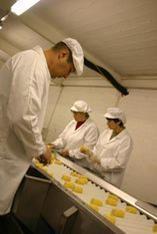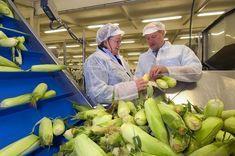

Major mushroom supplier Greyfriars has opened a new £300,000 packhouse to facilitate its diversification into sweetcorn, garlic and cabbage for Morrisons.
The £10 million Yorkshire-based company has transformed an old ammunition dump, near Ripon, into a state-of-the-art 13,000 square foot facility, with a 5,000sqft cold store and a customised sweetcorn stripping line.
Greyfriars operations director Charlie Merson said: “This is now our third year in corn so we didn’t come into this building as complete novices.
“In fact when you have hand-stripped, cut and wrapped more than two million cobs, although you don’t exactly know what you do want, you have a pretty good idea of what you don’t want an automated line to be like.”
The facility has already allowed Greyfriars to increase volumes from 20,000 to 500,000 cobs a week, with product from France, Morocco and Spain supplementing English.
The packhouse will process 10 million cobs this financial year and in 2005 it will be used to pack locally grown sweetcorn from what Greyfriars believes will be the most northerly commercial production area in the UK.
“We do think there is an opportunity to grow sweetcorn in the north - even in a summer like this,” said Merson. “Food miles are an important issue in agricultural production with 20 per cent of the costs of corn coming up from the south east being in transport.”
Greyfriars managing director John Smith said the move into new fresh produce lines could be a “life-line for local growers seeking diversification opportunities”.
Celebrity chef Rosemary Shrager officially opened the Standard House facility. A firm, but realistic advocate of locally-grown produce, she said: “It is because of companies like Greyfriars - and their willingness to diversify and strive to be the best - that the British public has so much choice these days.”
Smith said the investment, which follows a £500,000 cash injection just two years ago, is being made despite the effects of a “totally useless, unviable government and pretty brutal supermarket price wars.
“Our reputation for quality and service led to this diversification opportunity from our main buyer. To succeed in this environment, you have to get at it, keep working hard and find that niche,” he added.
Merson said the opening was a good news story, as it represented a “local business supplying a local national retailer with an un-supported commodity from the rural sector. It is important that land based industries remain close to the countryside to keep the rural economies alive, even though local people don’t necessarily seek occupation in the agricultural sector,” he added.



